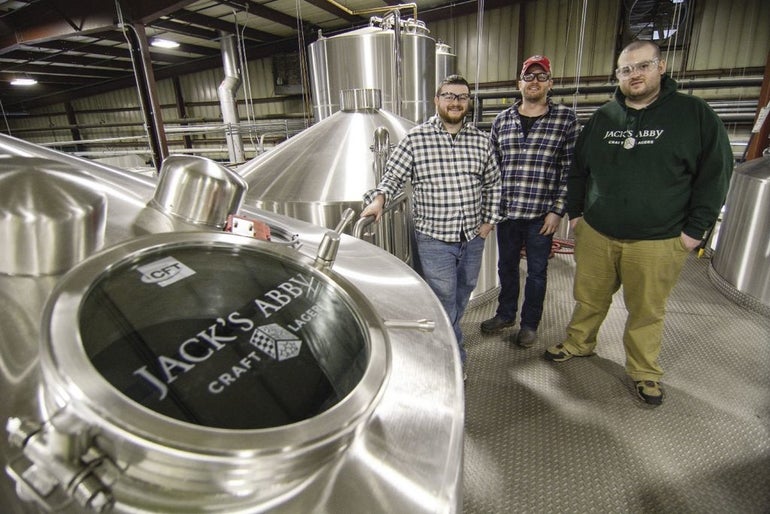Now that beer distributors have conceded that the statutory hold they maintain over brewers should be relaxed, the beer makers and distributors are at loggerheads over what defines a small brewer.
Producers of pilsners, stouts and ales touted legislation Tuesday that would give every brewer in the state – under their current volumes – the right to back out of their arrangements with distributors.
Katie Stinchon, executive director of the Massachusetts Brewers Guild, likened the current system to an inescapable marriage.
“It’s a partnership like a marriage, right. And if it works it works, and if it doesn’t work you want to be able to exit that relationship and not have to live with your spouse while you’re in court battling a divorce,” Stinchon told the News Service. She said, “There are a lot of brewers that are happy with their distributors, and there are some that are not, and there are some that are fearful to hand their brand over to an entity that will have direct control over its success without really having any upper hand or leverage to leave.”
On the other side of the debate at a Committee on Consumer Protection and Professional Licensure hearing, the business executives that put fermented products before consumers contended that only brewers whose annual output falls short of 930,000 gallons should be granted the freedom to back out.
Six months into a brewer’s relationship with a distributor, under state law, the bond becomes unbreakable for the brewer except under specific circumstances such as if a distributor disparages the brewer’s reputation, fails to “exercise best efforts” in promoting the beer or violates the terms of sale.
The brewers support a Rep. Alice Peisch bill (H 183) that would allow them to back out of a relationship with a distributor at any point as long as they make up no more than 20 percent of the distributor’s product.
Even the biggest craft brewer in the state, Jim Koch, maker of Sam Adams, acknowledged that his Boston Beer Company would not be restrained by the cap if Peisch’s bill became law.
Rep. James Arciero, a Westford Democrat, asked Koch how, with its nationwide and international footprint, Boston Beer Company should be in the same category as small brewers.
“We live in an industry dominated by giants,” Koch replied. Referencing AB InBev, the worldwide market leader that owns more than 500 beer brands, Koch said, “We compete with people 100 times our size. It feels pretty small where I sit.”
In their legislation, the distributors measure brewer size by a different metric than the brewers. After several years of resisting brewers’ efforts to loosen their grip, the distributors have gotten behind a bill (H 2823) sponsored by Rep. John Mahoney that would allow brewers that produce less than 930,000 gallons – or roughly 413,000 cases – of beer the freedom to sever ties with a distributor.
“You’re playing a different game once you get over that,” said William Kelley Jr., president of the Beer Distributors of Massachusetts.
That restriction would give start-up breweries freedom to change horses while keeping midsize Bay State beer brands such as Wachusett, Night Shift, Ipswich, Lord Hobo, and Cisco locked into their arrangements.
Explaining the group’s efforts to meet brewers halfway this session by supporting Mahoney’s bill, Kelley told reporters that Speaker Robert DeLeo and Senate President Stan Rosenberg conveyed that too many “precious legislative resources” had been spent on the dispute between brewers and distributors. Kelley said, “We were urged to come to the table and propose a solution.”
Distributors do far more than hauling beer around, though the industry is a major employer of the influential Teamsters union, which represents truck drivers. Distributors warehouse product, provide marketing materials and make sales calls.
Mark Tatleman, an executive vice president at Merrimack Valley Distributing Company, said that distributors “fight for shelf space, draft handles, displays and cooler placement” to put beer brands in front of consumers.
Tatleman told the committee how he helped local brewers launch Greenhead IPA, including stopping by the brewery with his father one night to help them put more than 6,000 cans into six-pack holders for delivery the next day and thus ensuring that “Newburyport had their hometown beer.”
Under Mahoney’s bill, Newburyport Brewing Company would still have the freedom to walk away, Tatleman told the committee, saying it is “the size brewer that should be allowed to leave.”
The so-called franchise law binding brewer to distributor made sense in a different era, decades ago, when one brewery could make up a distributor’s entire business, Koch said. While brewers are bound to their distributors, a distributor can drop a beer maker if it is not selling well or even trade the business to another distributor, according to the brewers.
Mike Epstein, of Horizon Beverage, contended that the franchise law has allowed distributors to remain independent, keeping interstate giants from muscling them out. Epstein said the law has helped foster diversity of craft beer on state shelves and menus, contrasting the array of microbrews available with the dominance of Coca Cola and PepsiCo products in the state’s soft drink market, where there is no similar protection for soda distributors.

